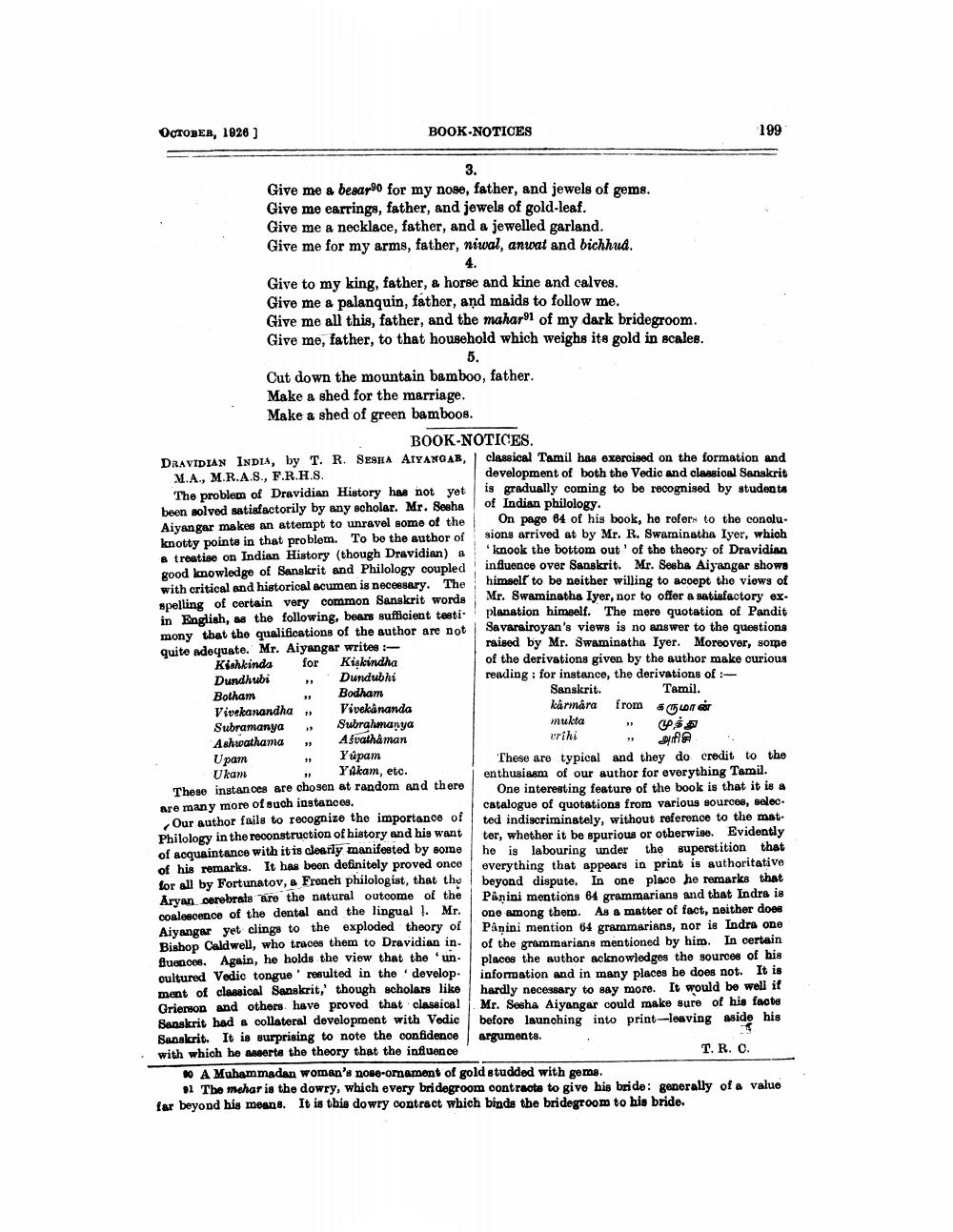________________
OCTOBER, 1928 )
BOOK-NOTICES
Give me a besar!0 for my nose, father, and jewels of gems. Give me earrings, father, and jewels of gold-leaf. Give me a necklace, father, and a jewelled garland. Give me for my arms, father, niwal, anwat and bichhud.
Give to my king, father, a horse and kine and calves. Give me a palanquin, father, and maids to follow me. Give me all this, father, and the maharol of my dark bridegroom. Give me, father, to that household which weighsite gold in scales.
5. Cut down the mountain bamboo, father. Make a shed for the marriage. Make a shed of green bamboos.
BOOK-NOTICES. DRAVIDIAN INDIA, by T.R. SESHA AIYANO AR, classical Tamil has exercised on the formation and M.A., M.R.A.S., F.R.H.S.
development of both the Vedic and classical Sanskrit The problem of Dravidian History has not yet is gradually coming to be recognised by students been solved satisfactorily by any scholar. Mr. Sesha of Indian philology. Aiyan gar makes an attempt to unravel some of the On page 64 of his book, he rolor to the conoluknotty points in that problem. To be the author of sions arrived at by Mr. R. Swaminatha Iver. which & treatise on Indian History (though Dravidian) al 'knook the bottom out of the theory of Dravidian good knowledge of Sanskrit and Philology coupled influence over Sanskrit. Mr. Sesha Aiyangar shows with critical and historical acumen is necessary. The himself to be neither willing to acoept the viows of spelling of certain very common Sanskrit words Mr. Swaminatha Iyer, nor to offer a satisfactory ex. in English, as the following, bears sufficient testi planation himself. The more quotation of Pandit mony that the qualifications of the author are not Savarairoyan's views is no answer to the questions quite adequate. Mr. Aiyangar writes
raised by Mr. Swaminatha Iyer. Moreover, some Kishkinds for Kişkindha
of the derivations given by the author make curious Dundubhi
reading : for instance, the derivations of : Botham Bodham
Sanskrit.
Tamil. Vivekanandha Vivekananda
karnira from கருமான் Subramanya Subrahmanya
mukta " முத்து Ashwathama Afvathaman
vrihi
yfa Upam Yupam
These are typical and they do credit to the Ukan Yakam, etc.
enthusiasm of our author for everything Tamil These instances are chosen at random and there! One interesting feature of the book is that it is a are many more of such instances.
catalogue of quotations from various sources, selec. Our author fails to recognize the importance of
ted indiscriminately, without reference to the mat. Philology in the reconstruction of history and his want
ter, whether it be spurious or otherwise. Evidently of acquaintance with it is clearly manifested by some
he is labouring under the superstition that of his remarks. It has boon definitely proved once
everything that appears in print is authoritative for all by Fortunatov, a French philologist, that the
beyond dispute. In one place he remarks that Aryan cerebrals are the natural outcome of the
Pånini mentions 64 grammarians and that Indra is coalescence of the dental and the lingual 1. Mr.
one among them. As a matter of fact, neither does Aiyangar yet clings to the exploded theory of
Pånini mention 64 grammarians, nor is Indra one Bishop Caldwell, who traces them to Dravidian in.
of the grammarians mentioned by him. In certain fluences. Again, he holds the view that the un
places the author acknowledges the sources of his cultured Vedic tongue ' resulted in the develop- information and in many places he does not. It is ment of classical Sanskrit, though scholars like
hardly necessary to say more. It would be well it Grierson and others have proved that classica! Mr. Sesha Aiyangar could make sure of his facte Sanskrit had a collateral development with Vodie before launching into print-leaving aside his Sanskrit. It is surprising to note the confidence arguments. . with which he asserte the theory that the influence
A Muhammadan woman's nose-omament of gold studded with gems.
1 The mehar is the dowry, which every bridegroom contracte to give his bride: generally of a value far beyond his moans. It is this dowry contract which binds the bridegroom to his bride.
myd
T. R. C.




